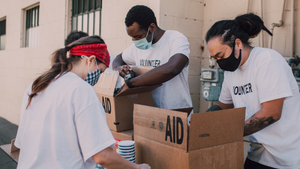In wake of Texas shooting, advocacy organizations call for stricter gun laws
Last week, America endured what has sadly become a familiar tragedy—on Wednesday, an 18-year-old shot and killed 19 young students and two teachers at Robb Elementary School in Uvalde, Texas.
May 31, 2022

Last week, America endured what has sadly become a familiar tragedy—on Wednesday, an 18-year-old shot and killed 19 young students and two teachers at Robb Elementary School in Uvalde, Texas. This tragedy came only 10 days after another armed 18-year-old shot and killed 10 people at a grocery store in Buffalo, N.Y. Advocacy organizations representing public administrators universally condemned the horrifying trend, which has been recognized as an epidemic in recent years, repeating a call that’s become synonymous with mass shootings: the need for stricter gun control laws.
“In the aftermath of the most recent mass shootings in Uvalde and Buffalo, the nation’s mayors stand united across party lines to say enough is enough. We refuse to allow the passage of time to relieve the pressure on Congress to act. Unless our elected officials in Washington finally take this crisis seriously, this plague will soon hit another American city and more precious lives will be lost,” reads a statement released by members of the United States Conference of Mayors’ executive committee.
The committee, which is comprised of 21 mayors representing communities across the United States, cited support for two specific bills that have received House approval and are pending in the Senate: The Bipartisan Background Checks Act of 2021 (H.R. 8) and the Enhanced Background Checks Act of 2021 (H.R. 1446).
Since the 1999 Columbine High School massacre, 169 students and teachers have been killed, according to a database compiled by the Associated Press, USA Today and Northeastern University. Education Week, a news organization that covers America’s schools, reports there’ve been 119 school shootings since 2018, including 27 so far this year.
Outside the classroom, a list compiled by Mother Jones details 129 mass shootings in the United States (a mass shooting is defined as an incident that has four or more victims) since 1982—with more than 1,000 victims. For mayors and local administrators across the country, the latest tragedies hit close to home.
“Heartbreakingly, the City of Uvalde, Texas joins the list of communities like Buffalo, N.Y., Parkland, Fla., Newtown, Conn. and far too many others that have faced the deaths of innocent residents at the hands of someone who should never had access to guns,” said Vince Williams, mayor of Union City, Ga. and president of the National League of Cities.
The federal government hasn’t taken any kind of substantial action, despite strong data showing the correlation between stricter gun laws and less frequent mass shooting events. The advocacy organization Everytown for Gun Safety’s research division, for example, notes that states that have loose gun laws with higher-than-average gun violence per capita.
“All states should start with a core group of five foundational laws—passing background checks and/or purchase permitting, along with Extreme Risk laws and secure gun storage requirements; and rejecting Stand Your Ground and permitless carry laws. While each of the top 14 states in the gun law rankings has all five of these policies in place, none of the bottom 14 states maintains any of these critical protections,” according to an introduction to the research.
California, the state with the strictest gun laws, has a gun violence rate per 100,000 residents of 8.5. Mississippi, which has the most lenient laws, has three times that rate at 28.6 per 100,000 people.
Given the data, Williams called on the federal government to take action.
“The status quo isn’t working. Congress must enact stronger laws that keep semi-automatic, assault-type weapons out of the hands of dangerous people seeking to do harm. There are common sense, widely supported practices like expanded criminal background checks that must be enacted without further delay. Public safety and Second Amendment rights needn’t be mutually exclusive,” he said.
And it’s not just mayors and civic leaders that want change. Gun violence is a well-recognized problem among the majority of Americans, according to research by Pew Research. A 2021 survey found that about half the nation (48 percent) think gun violence is a “very big problem.” Another 24 percent see it as a moderately substantial problem; a little more than 20 percent said it’s a small problem and 6 percent said it isn’t an issue at all. For comparison, that’s about the same percentage share as those who say the federal budget deficit, violent crime, illegal immigration and the coronavirus pandemic are major problems. Affordability of healthcare was the only issue perceived as a bigger issue, at 56 percent of respondents.
As the national debate over gun control heats up yet again, those communities impacted by the recent shooting sprees are left to pick up the pieces. Uvalde’s administrators intend to tear down Robb Elementary School, and Mayor Don McLaughlin has requested an investigation by the U.S. Department of Justice into the response by law enforcement.
“The goal of the review is to provide an independent account of law enforcement actions and responses that day, and to identify lessons learned and best practices to help first responders prepare for and respond to active shooter events. The review will be conducted with the Department’s Office of Community Oriented Policing,” according to a statement from the federal organization about next steps. “As with prior Justice Department after-action reviews of mass shootings and other critical incidents, this assessment will be fair, transparent and independent. The Justice Department will publish a report with its findings at the conclusion of its review.”







